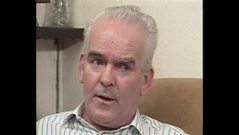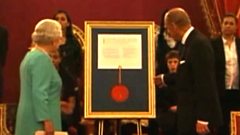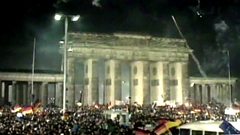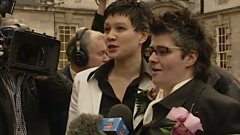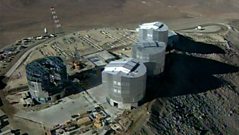
Maguire Seven win their appeal
The Maguire Seven have won an appeal against their conviction (on 4 March 1976) for making the explosives used in the Guildford and Woolwich pub bombs.
Laurie Margolis’ report begins with a wide shot of Patrick Maguire coming down the steps of the Royal Courts of Justice to meet the waiting press.
The Maguires have won an appeal (but on very narrow grounds) against their conviction (on 4 March 1976) for making the explosives used in the Guildford and Woolwich pub bombs.
The appeal judges deemed that forensic samples used to convict the family may have been innocently contaminated because they had touched objects already contaminated by nitro-glycerine. Another ground for appeal that there had never been any evidence of explosives on their hands or gloves was not upheld
In the mêlée outside the court Anne Maguire is described by Margolis as subdued. Mrs. Maguire thanks her supporters but states, “We have nothing to celebrate, we have lost 17 years and you don’t celebrate that.”
Patrick Maguire speaks to reporters; he denies that there were explosives in the family home and states that they are not a political family.
Chris Mullin MP, a supporter of the Maguire family, is unhappy at the grudging nature of the court’s decision, “It’s difficult to understand how people who are so clever can be so stupid at the same time.”
Laurie Margolis concludes his report by commenting that after 16 and a half years the ordeal of the Maguire family is, in the eyes of the law at least, now over.
CONTEXT
CONTEXT
On 5 October 1974 the Provisional Irish Republican Army (PIRA) targeted Guildford, Surrey, because it was situated close to a number of garrison towns. The PIRA planted two six-pound gelignite bombs in two pubs. The first exploded just before 9.00pm in the Horse and Groom, destroying the front of the building and shattering the windows of neighbouring shops.
It killed Paul Craig, a plasterer (22 years old); two members of the Scots Guards, William Forsyth (18) and John Hunter (17); and two members of the Women’s Royal Army Corps, Caroline Jean Slater (18) and Ann Ray Hamilton (19). A further sixty-five persons were wounded.
After the first explosion, other public houses were evacuated, including the Seven Stars where the second bomb exploded at approximately 9.35 p.m. without causing any serious injuries.
On November 7 1974 Gunner Richard Dunne, a soldier (42) and Alan Horsley, a sales clerk (20) were killed when a PIRA bomb exploded in the King’s Arms in Woolwich. Twenty-six people, including five soldiers, were injured.
In December 1974 the police arrested three men and a woman: Gerry Conlon, Paul Hill, Patrick Armstrong and Carole Richardson. In October 1975 these four were convicted of the Guildford and Woolwich bombings and given life sentences. The group was known as the Guildford Four.
On 4 March 1976 the Maguire Seven were convicted of making the explosives used in these bombings. The Maguire Seven were: - Anne Maguire, Patrick Maguire (Anne’s husband), Patrick Maguire (son of Anne and Patrick), Vincent Maguire (son of Anne and Patrick), Sean Smyth (brother of Anne), Patrick O’Neill (family friend) and Giuseppe Conlon (brother-in-law of Anne Maguire and father of Gerry Conlon).
Over the years, the cases of the Guildford Four and the Maguire Seven came under increasing legal scrutiny and the range of those seeking a review of the convictions extended widely. On 17 October 1989 it was announced that corruption proceedings would be taken against the police involved in the conviction of the Guildford Four. Two days later, with the exception of Paul Hill, those convicted for the bombings were released. This followed an announcement by the Director of Public Prosecutions that it would be wrong for the Crown ‘to seek to sustain’ the convictions of 1975 on the basis of confessions that they had later retracted. The Court of Appeal had decided that the DPP in 1975 had suppressed scientific evidence which conflicted with the confessions. Paul Hill remained in custody because he was implicated in a case that had not yet been resolved. His conviction was eventually quashed in April 1994.
On 26 June 1991 the Court of Appeal overturned the sentences on the Maguire Seven. All of them had completed their sentences. Afterwards many criticised the court for dismissing most of the grounds of appeal and had simply concluded that the hands of the convicted could have been innocently contaminated with nitro-glycerine.
Duration:
This clip is from
More clips from 26/06/1991
-
![]()
Maguire Seven’s convictions quashed
Duration: 02:14
More clips from �������� One O’Clock News
-
![]()
Royal Charter for Duke of Edinburgh's Award—16/11/2006
Duration: 02:10
-
![]()
Germany is Reunited—03/10/1990
Duration: 09:43
-
![]()
First Civil Partnership Ceremony—19/12/2005
Duration: 02:34
-
![]()
First pictures from the Very Large Telescope—27/05/1998
Duration: 02:06

